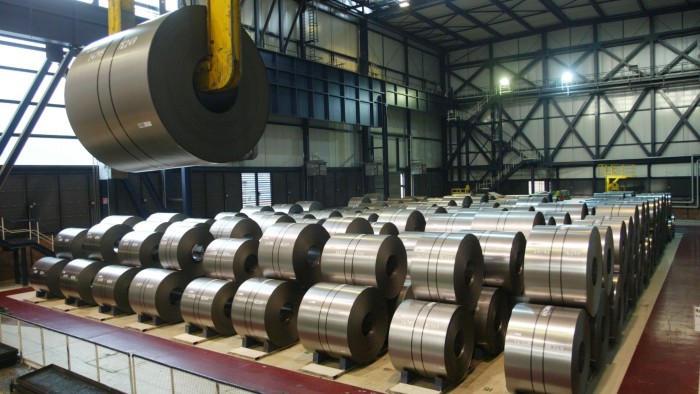Unlock the Editor’s Digest for free
Roula Khalaf, Editor of the FT, selects her favourite stories in this weekly newsletter.
The EU said it would retaliate against US tariffs on European steel and aluminium exports with “firm and proportionate countermeasures”, as officials in Brussels rushed to avert a trade war with Washington.
“The EU will act to safeguard its economic interests. We will protect our workers, businesses and consumers,” said European Commission president Ursula von der Leyen on Tuesday.
US President Donald Trump announced that the 25 per cent tariffs on all steel and aluminium imports would take effect on March 12.
EU member states have already approved levies of up to 50 per cent on €4.8bn of US imports and could quickly take a final vote to impose them. The products would include bourbon whiskey, Harley-Davidson motorcycles, motorboats and some steel and aluminium.
Von der Leyen will meet US vice-president JD Vance in Paris to discuss the issue while the commission called a meeting of trade ministers for Wednesday afternoon.
EU trade commissioner Maroš Šefčovič told the European parliament the bloc was aiming for talks. “We remain committed to constructive dialogue. We stand ready for negotiations, and to find mutually beneficial solutions where possible.
“There is a lot at stake for both sides. We want to make it work, not least because it simply makes sense.”
He added: “The EU sees no justification for the imposition of tariffs on our exports, which is economically counterproductive. Especially given the deeply integrated production chains, established through our extensive transatlantic trade and investment ties.
“Tariffs are taxes; bad for business, [and] worse for consumers.”
The whiskey tariffs were first levied in response to metals tariffs imposed by Trump in his first term as president. That dispute was frozen under former president Joe Biden but not resolved.
They will automatically come into effect at the end of March, unless a majority of EU countries agree to do so sooner.
Brussels could also widen its retaliation but von der Leyen stressed any response would be “proportionate”.
The EU steel industry is already shrinking, with production hitting its lowest level in 2023. The tariffs on exports of about 3.7mn tonnes a year will hit it hard, said Axel Eggert, director-general of Eurofer, the industry body.
“The last tonne is the most profitable tonne because we have such high fixed costs,” he said.
Steel from elsewhere in the world that has been pushed out of the US markets could also be exported to Europe, further depressing prices, he said.
The UK has not threatened to retaliate against the US steel and aluminium tariffs, as Sir Keir Starmer attempts to avoid a trade war with Trump and instead deepen economic ties, especially in technology and professional services.
Although the prime minister’s allies say no decision has been taken on whether to respond to the latest tariffs, the government has tried to downplay expectations of any reprisals. It said the US accounted for only 5 per cent of UK steel exports in 2023 and 6 per cent of aluminium exports.
“It’s important to see this in the context of our exports,” said a spokesperson for Starmer.
Although the UK government backs free trade, it has also drawn up contingency plans in the event of an escalation.
The UK steel industry has claimed that Trump’s move would be a “devastating blow” to the sector.
Read the full article here




